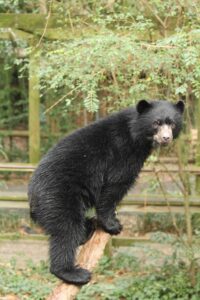
Salisbury, MD — One of the Salisbury Zoo’s Andean bears, Raymi, will make an international move this September – to Zoo Zürich in Switzerland.
Raymi was born Jan. 16, 2022, at the Salisbury Zoo, and has already stayed at the Salisbury Zoo longer than most cubs do. His twin, Inti, moved to the Racine Zoo in Wisconsin in May. Their parents are Chaska, who is still at the Salisbury Zoo, and Pinocchio, who has moved to the Nashville Zoo for now.
The Andean Bear Species Survival Plan, or SSP, recommended that Raymi go to Zoo Zürich. The SSP works closely with Andean Bear SAFE, or Saving Animals From Extinction, of which the Salisbury Zoo is a program partner and Registrar Jessica Mandelson is secretary. Because of the international move, the Andean bear conservation counterparts in Europe were also involved.
“Zoos are working together internationally to move bears around to increase genetic diversity,” Mandelson said. “Because Pinocchio was wild-born, his genetics and offspring are helping to increase the genetic diversity of Andean bears on an international level.”
In Zürich, Raymi will be with a female Andean bear, with hopes they will breed.
Andean bears are a solitary species and only come together for breeding, and Raymi has already been separated from his mother, Chaska, since last year – as it would be in the wild. Chaska let the animal care staff know through her behavior when it was time to separate from the cubs. Raymi and Inti would also have gone their separate ways in the wild.
Mandelson and the Salisbury Zoo’s veterinarian will be traveling with Raymi to Switzerland and will help with Raymi’s transition to his new environment.
Raymi’s last day on exhibit at the Salisbury Zoo will be Sept. 2, ahead of the start of the journey to Zürich the next day.
Although the Zoo staff will miss Raymi, his international move is important for conservation of the species.
“The Salisbury Zoo has had successful Andean bear breeding for many years, and we are proud to be involved in helping grow the Andean bear population under human care on this international scale,” said Zoo Director Chuck Eicholz.




